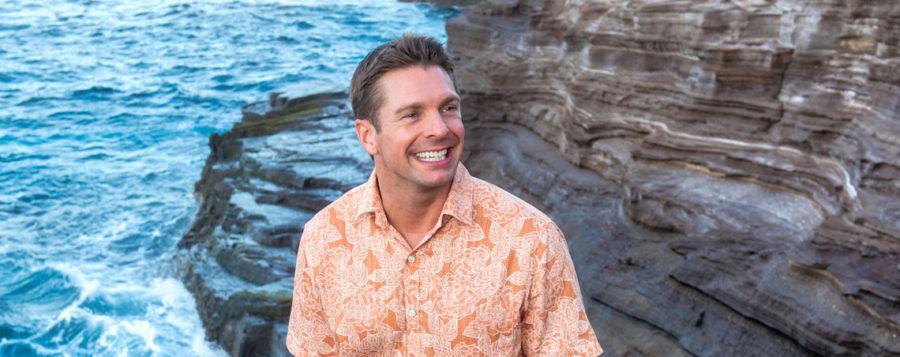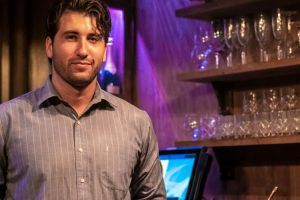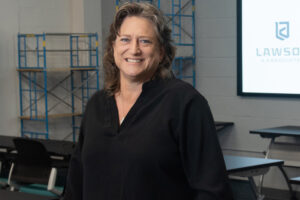Like so many things in Corey Campbell’s life, putting down roots in Hawai‘i wasn’t part of some grand plan. On a whim, he applied for a student exchange program with the University of Hawai‘i at Manoa and spent his sophomore year here while pursuing a psychology degree from Virginia Tech.
“It’s funny, psychology is one of hardest degrees to plug into a job unless you go into psychiatry, but I’ve found that it applies to every single thing I do,” Campbell says. “All training is is reading a person and understanding what would motivate them to change their behavior, and then attaching that to what you’re doing.”
Campbell first fell into training during his years teaching English in Japan. While there, he picked up the Japanese language fairly well, a skill that helped him land a job as a guest services manager at the Sheraton Waikiki when he eventually returned to Hawai‘i for good.
Putting his plans for medical school on the back burner, Campbell seized the opportunity to lead internal brand training for the company his second month on the job. He discovered that he loved training others and, what’s more, that he was good at it.
Campbell took his newfound skillset with him when he went on to help open Rum Fire, where he managed daily operations and led employee workshops as its assistant manager. “Everyone should be forced to work in hospitality at some point in their life,” Campbell says. “It helps you bring a customer service approach to everything you do.”
When The Royal Hawaiian reopened as part of the Luxury Collection, Campbell mined a new role there as a learning development manager, developing the training program that would later inspire him to found his company Akamai Training & Consulting.
“I do a lot of empathy training,” Campbell says. “And it starts with identifying what real empathy is. People say to put yourself in the other person’s shoes, well that’s wrong. If I put myself in your shoes, I’m still looking at the situation through my eyes.”
“Everyone talks about the golden rule—treat others the way you want to be treated,” Campbell says. “But that assumes what you want is the same as what I want.” Real hospitality, he argues, is about making an earnest effect to get to know a person, learn how they tick, and ask the right questions to arrive at an understanding of what they want and how they want to be treated.
Campbell’s leadership development training is one of three arms of his business, spanning everything from Myers-Briggs evaluations to executive retreats. “I spend a lot of time on culture,” Campbell says. “Culture is everything in an organization.”
“Great leaders realize that water runs downhill,” Campbell says. “If your team isn’t performing as well as you’d like, the first place you should look is inside. What aren’t you doing to drive your team?” Even better, he says, take it a step further and just ask.
Campbell is an advocate of the start-stop-continue approach to seeking feedback from employees. He instructs his trainees to ask their staff to name one thing that drives them crazy that they wish you’d stop, one thing you’re not doing that they wish you’d start and one thing they love that you should continue to do to make their job easier. “When you ask people those questions,” Campbell says, “they tend to have an answer.”
He also believes the difference between good leadership and great leadership comes down to intention. “What’s your reason for doing for doing what you do?” he says. “People can tell if you’re only in your current role to get promoted. Whatever job you’re in, approach it as if it’s the one you’re going to have for the rest of your life.”
The other two arms of the business are executive coaching, where Campbell works one-on-one with people to help them achieve greater self-awareness and growth, and module training sessions that address specific areas, such as relationship building, team dynamics or emotional intelligence.
Campbell’s training sessions are deliberately experiential in nature, and they often force people out of their element. But Campbell says the frustration people feel during the exercises are key to their progress. “Anytime passion is involved, people start to listen.”
Dissecting your approach to the exercises are another important part of the process. Campbell says there’s often a discrepancy between how a person thinks they behave, and how others know them to behave. “So I ask them, ‘What would others say?’” Campbell says. “In other words, ‘Are you certain you’re the coworker or employee you think you are?’”
Campbell is adamant that the goal of his training programs isn’t just to make people better leaders and employees. He insists that when you improve yourself on a personal level, it will only impact your professional life for the better. “Life is a product of your most dominant thoughts,” Campbell says. “So what story are you telling yourself? If you can’t change the situation, why not change the story?”
corey@akamaitraining.com




